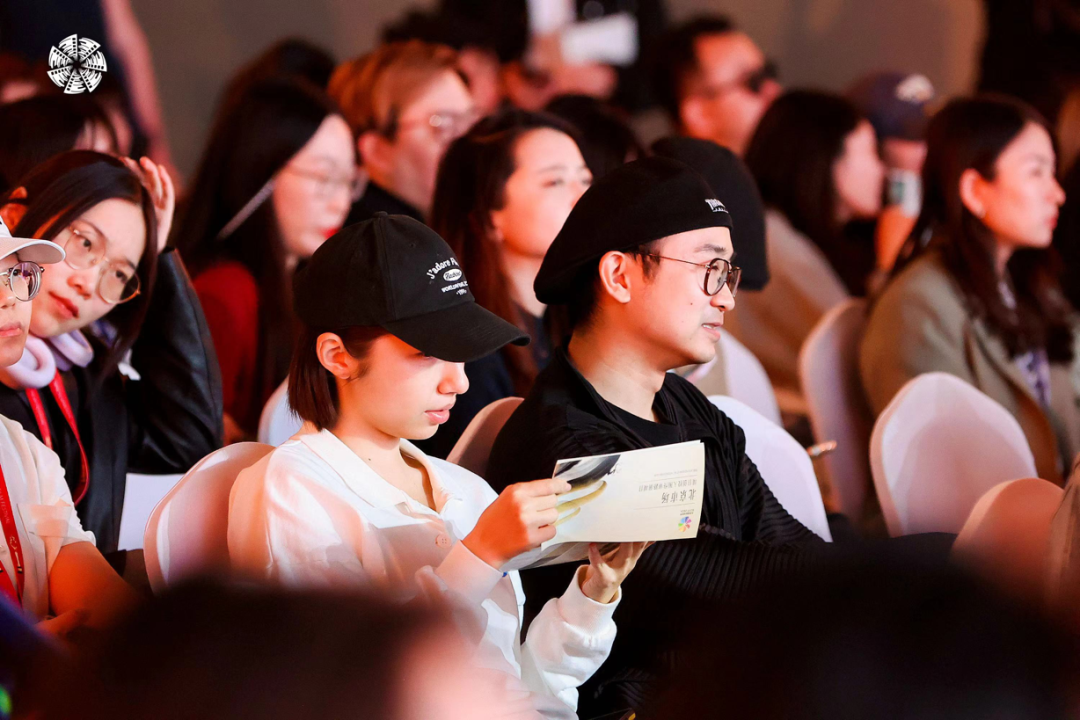Market
Beijing Film Market Project Pitches: Show Your Talents and Live Your Dreams
Creation has never been a solitary process of putting your thoughts down on paper, but rather an exchange of ideas resulting in an echoing impact. On the first day of the 14th Beijing International Film Festival (BJIFF) on April 19, the final Beijing Film Market Project Pitches kicked off. At the event, Beijing Film Market Art Director Zhang Ji led the review panel, while the jury of Project Pitches, including film director Stanley Kwan as the president, as well as members Da Peng, Liu Haoran, Derek Tsang, and Zhang Mo, listened carefully to every young creator's pitching and advised on how best to transition from script to screen. The five jurors generously praised the pitching projects' strengths and provided their invaluable advice with targeted precision.
The final Project Pitches saw a bustling crowd of industry professionals showcasing their excitement and anticipation for the event. The event was highly anticipated not only by potential buyers from film studios but also by many budding young creators eager to gain valuable insights. Perhaps this opportunity would serve as a launching pad for these young creators who are poised to take the stage next year.



Scene of Project Pitches
With 769 submissions collected during a period north of 100 days, the Beijing Film Market Project Pitches of the year culminated in two rounds of evaluations spanning five months, with the participation of 8 companies for the first-round review, 3 judges for the second-round review, and 2 trainers. As a result, 21 outstanding projects were chosen to proceed to the final round. During the first day of the final Project Pitches, 15 project owners stepped onto the stage to present their conceptual ideas and aspirations.
In a significant move, the Project Pitches of this year partnered with the Beijing Culture Guiding Fund for the first time, to provide young filmmakers with an even more extensive platform and a plethora of opportunities.
As for Project Pitches, part of the Beijing Film Market, there is a clear veil and continuity. Prior to the start of the event, Zhang Ji shared his excitement in returning to this year's Project Pitches in a new role, having previously served as a judge last year. This echoes the event's theme of "Homecoming" this year, which emphasizes that not only the filmmakers participating in the previous editions are encouraged to come back from time to time with new works, but also the jury members can bring in new ideas and expectations, and return to this platform as well.
Being a filmmaker currently engaged in filmmaking, he has come into contact with numerous young filmmakers. Despite their varying backgrounds and experiences, he believes they are all grappling with the same challenge—the film industry is undergoing changes in areas such as investment, audience numbers, and genre demands. In the face of such changes, filmmakers need to band together, engage in sincere communication with each other, seize opportunities, and draw from the insights and support that arise from their intellectual exchanges. "Though short-lived, the two-day trip is still a journey. During this time, whether or not you are willing to open up, trust others, and believe in yourself depends on what is truly inside of you," said Zhang.

Zhang Ji
This is also the driving force behind the creation of the Project Pitches platform at the BJIFF, where experienced and emerging filmmakers can interact with one another, and where the convergence of various subdivisions within the industry can infuse Chinese cinema with new vigor and invigorate the market.
Taking center stage as the first project presented was Breathe under the Ice, a film of the suspense genre. Director Zhang Mo, who is no stranger to crime-thrillers, shared her unique perspective on the distinctiveness and differentiated approaches of such genres. "It's imperative to stay grounded in the audience's viewing habits and expectations," she remarked. "Suspense narratives necessitate extensive emotional exploration and meticulous build-up for coherence. Finally, a well-executed reveal can provide the necessary contrast and twist, meeting the audience's anticipation for suspense."
Every judge had distinct aspects they paid attention to. In his role as the jury president, Stanley Kwan prioritized foundational aspects, including preliminary research, detailed script-writing, and character portrayal. Moreover, he carefully evaluated the presentation of the era's ambiance during filming. Taking TUNG HWA FOOTBALL CLUB set against the 1930s as an example, he was mindful of the interplay between budget considerations and the final visual outcome. On the surface, it may appear to be the simplest aspect, akin to laying the groundwork for erecting a skyscraper. However, the foundation determines the ultimate height of this story. In fact, Stanley's recommendations could sharply identify the issues within the script. Consider Listening to Arrows, a film adapted from real-life events. Stanley recommended, "As a sports film, what's crucial is to grasp the essence of the emotions these two prototype characters offer." As a filmmaker who wears multiple hats as director, screenwriter, and producer, he combined his creative experience with the specifics of the competing projects, providing the most comprehensive guidance.
Actor Liu Haoran also mentioned the nuances of play writing as well as how to create a sense of realism in storytelling. When reviewing the My Strange Family project, he underscored how location scouting is essential to establish a sense of realism within the narrative, "The script's first half exuded a powerful sense of realism that is only attainable through a genuine county-town backdrop. The creative team and the actors must possess a deep grasp of the environment to fully convey the sense of realism. For example, when depicting a street scene, it needs to appear believable, or else the sense of realism will be compromised." He also mentioned Dwelling in the Fuchun Mountains and Four Springs, emphasizing how the environment's authenticity helps viewers fully immerse themselves in the story.

Stanley Kwan
As a leading figure in the actor-turned-director category, Director Dong Chengpeng embodies the overlapping charm of both performance and directing. At the scene of Project Pitches, many directors involved chose Dong as their desired actor for their respective projects. For instance, a character somewhat resembling Dong can be seen in both of the two pitching projects, The Man Without Desire and Breathe Under the Ice. When describing his acting style, Dong humorously referred to himself as "a dedicated actor for a role of the loser", evoking lively conversation at the event.
Beyond adding to the liveliness of the atmosphere, Dong Chengpeng also shared his insightful opinions. In a project presentation, it was mentioned in PPT that they do not rely on actors with a huge number of followers. This caught Dong's attention and he commented, "This is a topic worth discussing. Many well-known actors have been involved in failed projects, but it remains to be proven if it is due to the actors themselves or a causal relationship. Conversely, successful projects have also featured well-known actors. Was their success due to the actors or the project itself? As both a director and actor, I believe there is too much focus on actors in project discussions. A project is a whole entity and requires every individuals to contribute their efforts, and failure cannot solely be attributed to the actors nor success to other team members. If an actor's performance is not excellent, it is ultimately the responsibility of the director, who selects the actor. The most crucial factor when selecting actors is suitability, not simply avoiding certain types."
As an actor, Liu Haoran reflected on scripts from an actor's viewpoint, especially in stories with prototype characters, considering how actors can immerse themselves in their roles. His belief is that creators "must support actors in overcoming difficulties" because they spend more time with prototype characters. As he said, "The two prototype characters are already present here. As actors play them, a deep sense of security is required, which comes from you."

Dong Chengpeng
Regarding the comedy film The Man Without Desire, Zhang Mo proposed the idea to "transform this somewhat heavy and difficult-to-discuss topic into a comedic one", while offering additional female viewpoints. Zhang contended that to win over female viewers in romance films, male characters' charisma needs to be enriched beyond their struggles. With regards to Wake Me Up, Zhang commended the film, stating that "it strikes a chord with many female viewers and touches on their soft spots, particularly for women who are mothers. However, commercially speaking, there is still room for improvement". Liu Haoran and Dong Chengpeng suggested adding "more autonomy, choices, and drive" to the female characters. The judges shared their unique perspectives, based on how well the screenplay fits into the market, resulting in an array of opinions presented at the Project Pitches event.

Zhang Mo
As for the film Guangde Theater, which centers around the Peking Opera, Dong Chengpeng lauded the creators for their attention to traditional themes. Based on market guidance, Dong suggested that the creator should "deepen the depiction of the Peking Opera and lower viewership barriers to boost accessibility". Derek Tsang highlighted the changes in memory description for different characters in the script, so as to produce a superior dramatic effect. Speaking about the family film My Strange Family, Liu Haoran stressed the importance of a sense of realism for the actors' sake. He recommended that the film "should take place in a real-life county town, where actors can genuinely feel the environment and even the street scenes".

Derek Tsang
Concerning the business-oriented suspense thriller Who Was There, Derek Tsang acknowledged the director's skill in crafting suspenseful plot twists. However, he proposed a reassessment of the portrayal of the twin characters. Liu Haoran expressed the view that this adjustment "could improve the script's coherence but might impact audience acceptance in later stages". Dong Chengpeng supplemented this by suggesting a need to "address the story's credibility". With respect to Three Days, Dong Chengpeng recommended "placing primary emphasis on the relationship between the two lead characters, with other elements serving to support them". In regards to Accomplice, Liu Haoran expressed that "while the story's premise is intriguing, what's lacking is a director who can approach the script with a filming perspective, immersing characters and the entire scene into the creative process. While the story is cohesive, it lacks the underlying logic of the characters and emotional depth that could evoke empathy from the audience." Zhang Mo suggested delving deeper into the depth of human nature.

Liu Haoran
The projects eligible for the final Project Pitches inevitably boast certain advantages. Some judges underscored the importance of script coherence. It's a fundamental criterion for a script to serve as the foundation of a production, yet it also poses a double-edged sword. A script with only "coherence" lacks the ability to move its audience.
The greater the anticipation for a story, the more thought-provoking and insightful the comments came from the judges, who also considered casting choices in addition to the script. Their aspiration is to locate the optimal direction for each story, bringing words to life on the silver screen—a shared desire of creators alike.
On the morning of April 20, six WIP projects will take the stage, with the winners of eight Project Pitches honors to be unveiled in the evening. These include the Jury Special Recommendation Award, Best Original Script Award, Project with Greatest Commercial Potential, Project with Greatest Development Potential, Most Investment Value Project Award, Production Team with Greatest Innovation Award, Most Marketable Focus Award, and Beijing International Sports Film Week · Sports Film Project Support Fund. As contenders converge, the anticipation mounts: who will claim the laurels?
The greatest appeal of Project Pitches lies in the opportunity to speak and share doubts about the creative process with final-round jury members in person, who can listen to the voices of young filmmakers and help support them. Judges will graciously impart their industry experience and patiently advise filmmakers. It takes only one piece of advice to break creative barriers, paving the way for outstanding projects to emerge and flourish in the fertile landscape of the market.
The path from words on a page to motion picture represents a dream that countless young filmmakers pursue with incredible passion. Project Pitches acts as a rainbow bridge that adds vivid hues to the stark contrast of black-and-white text, fueling the heartbeat of creativity.
Please download the Beijing International Film Festival APP for more interesting content

